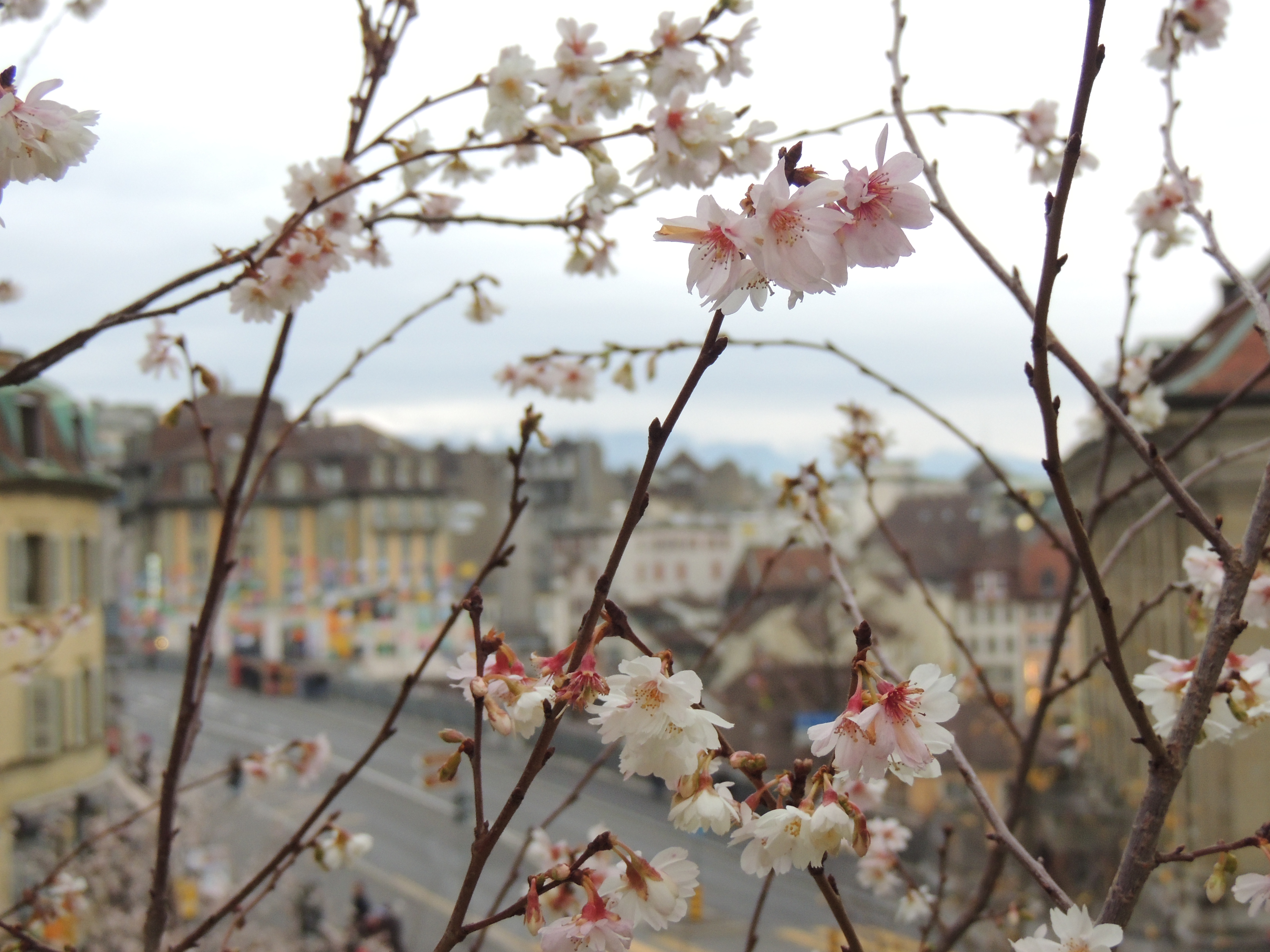PRE-DEPARTURE – OR, THE VERY LONG ADMIN SECTION, NEATLY COMPARTMENTALIZED
Accommodation:
This is probably the most stressful admin matter to sort out before departure. Now, this is not dreadfully stressful in and of itself, except that, if you apply for accommodation through the FMEL, the student accommodation company, you will need to pay a security deposit (+/-1200chf) and the first month’s rent a month or so in advance, and in ZAR, it’s a scarily large amount. With regards to accommodation, the FMEL is definitely the simplest way to go, especially if you don’t have any contacts in Lausanne. The one disadvantage is that you don’t ultimately get to choose in which of the FMEL’s residences you’ll be staying, so you might strike lucky get it cheap (400-600chf per month) or, like me, end up in a more expensive, though slightly more fancy residence (750chf).
VISA :
Prior to departure you will need to apply for a National type D Visa. Call the Swiss consulate to make your visa appointment (for the type D visa, there isn’t an option to make the appointment online) and bring 3 copies of all the required documents. These, interestingly, include a CV and a signed declaration that you will indeed be leaving Switzerland after proposed period of study, but do not include flight tickets or medical insurance, the latter of which is to be dealt with upon arrival.
Insurance :
About medical insurance: it is compulsory for all foreign students in Switzerland, and you have the option either of buying insurance with an accredited insurance company in Switzerland upon arrival, or of buying insurance in South Africa and having your insurer sign and stamp this formula: http://www.vd.ch/fileadmin/user_upload/themes/sante_social/aides_allocations/fichiers_pdf/Attestaion_GLAS_2012__E_.pdf thereby declaring its insurance to be equivalent to the insurance requirements in Switzerland. I chose the latter option, but my formula was only signed and not stamped, and by a travel agency from which I bought it. Thus, I have received notice that it is invalid and that I will need to purchase new insurance here in Switzerland. The possible loophole: you are given 3 months or so to make up your mind from which company you’d like to purchase it, after which, if you still haven’t done so, one is chosen for you (I’m hoping negotiations and questions might slightly extend those 3 months). Hence, since I will be staying in Switzerland for about 4 months, it may work out cheaper for me to pay the one month or whatever time is left over on whatever company is chosen for me than the full 4 months on a company of my choice (Note: please do not dispense with insurance all together, I only intend to go a bit rogue on this one because it’s highly annoying having to pay for additional insurance whilst already being insured).
Residence permit:
Within 10 days of arrival in Switzerland, you will need to register at your address at your local commune/municipality and apply a residence permit (+/- 120chf). Supposedly it takes a month or so to get this, but it’s nearing the two months and I haven’t as yet received mine. You will, however, be given a sort of interim statement to say you have indeed applied, which you will need for admin tasks such as opening a bank account. Fill in the application form online prior to departure if you are able to do so. One is permitted to do so at the actual commune, but you’re likely to get some rather stink looks, especially if it’s a busy day. Other than the form, you will provide a copy of your rental contract, your university acceptance letters, and two passport-sized photos.
Transport:
If you’re considering travelling fairly extensively in Switzerland, get the demi-tarif/half-fare card: Swiss trains are crazily expensive, and the card, while it seems pricey (165chf valid for one year), will quickly pay for itself. That being said, if you haven’t yet travelled much in Europe, you may want to consider spending most of your travel time elsewhere: because in all honesty, a train to Bern can cost the same as return flights to Berlin (do go to Bern though, it’s a pretty city, and, I am told, is considered by the Swiss to be artsy and laid-back). The monthly transport card for Lausanne is about 50chf. You can buy the card at the tl company (basically the transport company, where you can also buy the demi-tarif card) near the Lausanne-Flon metro station. For both the monthly ‘mobilis’ card and the demi-tarif card, you will need an identity document and an ID photo.
Then, for travel in general, look out for cheap flights and busses. Trains are lovely, of course, but mostly quite expensive, unless booked far in advance. Easyjet flights from Geneva can get you almost anywhere for super cheap (as in, 50 chf return to Paris, 20-30chf on certain dates for places like Berlin or Barcelona). Also check out Blablacar for car-shares.
Budget:
As for general budgeting, the grant of 1750chf is more than generous, depending on your lifestyle and where you ultimately end up staying. On arrival in Lausanne, you’ll receive a cheque for half a month’s grant – i.e. 875chf – so you won’t starve. You will then need to open a Swiss bank account, into which all subsequent grant payments will be made. Shopping at Aldi and Lidl is best if you’re on a budget, but Migros and Denner aren’t bad either. Keep an eye out for specials. If you eat cheaply (i.e. at home, lentils, Lidl food and whatever happens to be on special) you can have a substantial amount left over for travel at the end of each month (if alimentation is costing you more than 500chf a month, you’re doing it wrong). Also, you’d probably best not shop for clothes in Switzerland. There may be some relatively speaking less-expensive items available, I’d recommend rather buying whatever you need whilst travelling elsewhere (someplace like Berlin, Brussels or Barcelona). Another way of saving money is to bring along some crockery and cooking utensils, if you have space, so you won’t have to buy them here.
One more tip: go to the welcome days – both the one for exchange students and the general one for all new students (the latter of which is followed by a societies fair). Not only will they provide useful information and an opportunity to meet new people, but they also tend to be quite liberal about handing out free snacks and tote bags.
FIRST IMPRESSIONS OF LAUSANNE AND UNIL
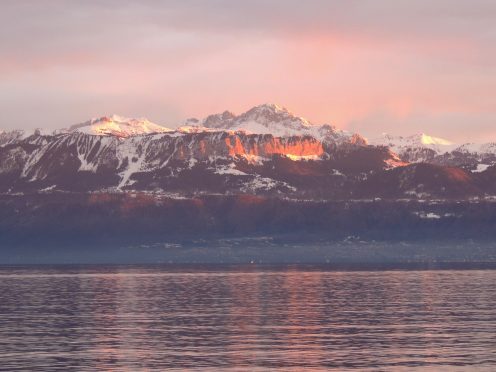
While pre-departure and the first few days after arrival were fairly packed with admin matters, these all ran quite smoothly for me, with my main concern being my as-yet unfinished Honours thesis for back home, which I had to submit a few weeks after arrival.
Campus is absolutely lovely, with sheep and cows and little forests, all on right on the shores of Lake Geneva. There are over 300 sports on offer, most of them free, and most quite social or open to beginners, from rock-climbing, to salsa, to sailing: there’s even a course entitled “sport for those who don’t like it”. In terms of culture, campus has its own little theatre, housed in a renovated barn, as well as a cinema club, and various other societies, with subject matter ranging from philosophy to comics to art-exhibitions.
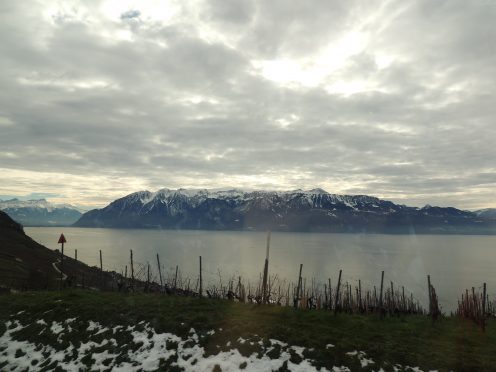
In terms of academics, I find my classes quite similar to the postgrad classes I had back at Stellenbosch. Courses are structured around class discussions, lecturers are very approachable and usually addressed by their first names, and student numbers range from 10 to 30 students per class. The English department, especially, has quite a convivial atmosphere, with social “cake-T days” (that is, Tuesdays or Thursdays) for MA and PhD students to mingle, a little magazine of its own, and a couple of parties throughout the term. What is more, there are organised trips for postgrad students to attend ‘distinguished lectures’ by internationally renowned academics at the University of Bern or Fribourg, and train-fare is generally reimbursed. One interesting point of comparison between the University of Lausanne and the University of Stellenbosch is that until very recently, one did not receive grades for most courses at Unil, but simply passed or did not. I also get the sense that essay submissions and so forth are rather more flexible than they are at Stellenbosch. Some of my friends, for example, are still finishing of essays that were technically due last semester. Also, class attendance is not compulsory, and lecturers urge us to “please come if we are able to, although we won’t be penalized for not doing so”.
I’ve been fairly lazy in my course selection and haven’t taken on any extra courses, but just the general three most English MA students over here have per semester. My courses, as they stand, consist of one on the poetry of Yeats, one on Critical Theory, and one on the theme of descents into the underworld in literature from the Virgil through to Conrad, Primo Levi and Angela Carter. I find all of these intellectually very stimulating, yet relaxed enough to leave plenty of time for travel and exploration. Outside of the university, I’ve joined a football club in the city, and I must remark, the facilities are incredible in comparison with the kind back in South Africa (if I understand correctly, each licensed football club in Switzerland is subsidized by the State, hence, locker rooms, fields, kit etc that are impressive by South African standards).
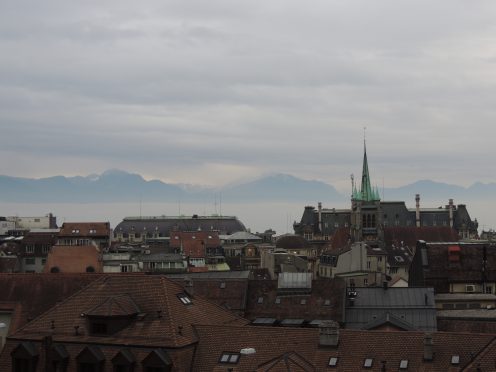
Lausanne itself is a lovely little city. Although by no means an ‘exciting’ or ‘buzzing’ metropolis, it is very pretty, with delightful streets, cafes and little bars (not all that many, but there are some good ones). The surroundings are absolutely breathtaking: the vineyard terraces of Lavaux that slope down to Lac Leman, with little towns tucked away in their midst; stylish Montreux, with which was frequented by likes of Lord Byron, Freddy Mercury, Hemingway and Stravinsky; Vevey; the Chateau de Chillon (which Byron wrote a poem about). There are few things more magnificent than a train-ride hurtling past paysages of steeply-sloping vineyards that end abruptly in the immensity of the Leman. Another interesting fact: Mary Shelley’s Frankenstein is largely set in this region.
Lastly, one fascinating aspect of Switzerland is its different cantons, and its four different language-regions. Travel an hour away from Lausanne, to Bern, and the French gives way to German. And while technically the French Swiss and the German Swiss are supposed to learn each other’s languages, they seem to do so rather imperfectly, for the large part. And then within the language-regions themselves there are differences, so that the Bern and Zurich have very different atmospheres, the former being more laid-back and alternative, and, I am told, probably being more like the French speaking Switzerland than it is like the latter busier and more ‘rigorous’ Zurich
Return:
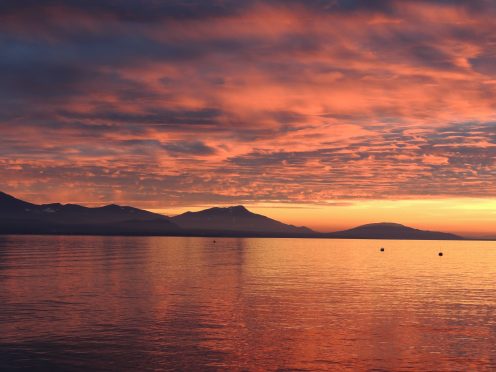
I spent my last day in Lausanne not in the city, which, while beautiful, always remained for me a somewhat alien sphere, but beside the lake, that ethereal and translucent mirror of tranquility that, with its rhythmic throbbings against some pebbly shore, and the mathematical tracings and eracings ever playing on its surface, remained throughout my stay, my fondest environs. I know now why Byron and the Shelleys so loved it, why Hemingway and Stravinsky and Charlie Chaplin were all drawn here at some point or another in their lives, as by a hidden magnetism in its vast expanses. The sunset of the night before had been spectacular, and heartbreaking. All things now fallen apart and come to an end, I joined a friend for a last coffee on campus, and caught my final train to Geneva airport, whence would leave that not unwelcome homeward aircraft. An evening flight: a fitting finality to it.
Homecoming. The joy of brothers, sister, parents – put out of mind for the most part whilst abroad, yet now, like the chance revisiting of a favourite but half-forgotten melody, or the retracing of steps to a place once familiar, resuscitated in all their dear vivacity. My return was, all things told, unremarkable, an unobtrusive taking up again of the old life, the old habits, now cherished again in their newness. There is a sense of welcome, of happy familiarity, returning to the English department, to my football team, to my favourite café.
As for change, that bittersweet agent of life and becoming, I have not, of course, escaped its course; yet it is too early to tell how exactly I have been affected. Hemingway wrote somewhere that he could now write of a place whilst there, or with it too recent in his memory, and I feel similar about these months I have been privileged enough to spend in Switzerland. I have changed, undoubtedly, my manner of thinking, my view of things, the way I interact with others all subtly and almost imperceptibly shifting, but I cannot quite give expression to any of this, I do not yet know how it will play out in my life. What I can say is that my intellectual life has profoundly benefited from these few, precious months, with the lectures I was fortunate enough to attend – both in the English department in Lausanne and distinguished guest lectures in Bern – with the wonderful cities and artworks and centres of culture I have now, for the first time, been exposed to.

